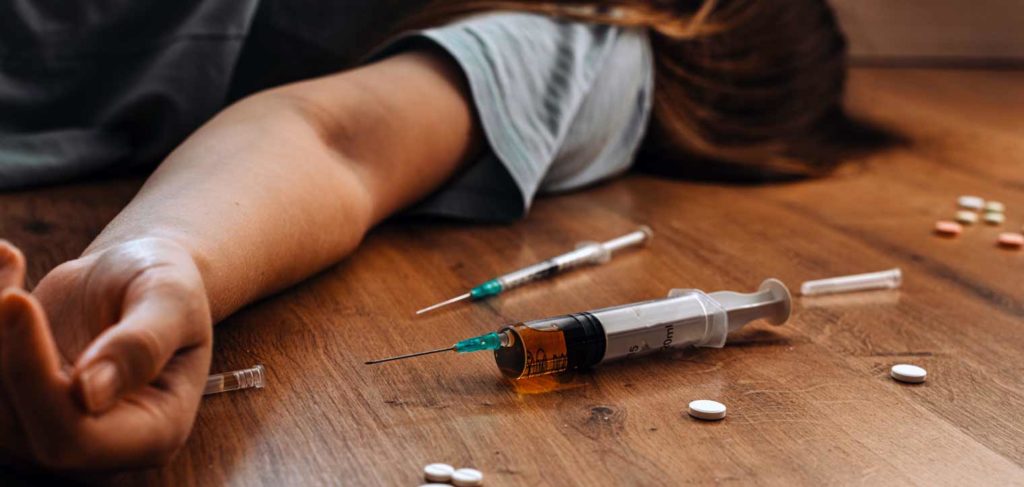Suicide, the act of deliberately taking one’s own life through one’s own actions, is one of the leading causes of death in the United States. It is especially a problem among young people. The link between drug abuse and suicide has been firmly established and will be looked at more closely over the course of this article to help raise awareness nationwide.
Suicide is the tenth leading cause of death in the country and the second leading cause of death for 15 to 34-year-olds. It is also the third leading cause of death among people aged 10 to 14. Suicide is considered a health epidemic. In this post, we’ll look at the connection between alcohol and drug abuse and suicide.
Are Suicide and Substance Abuse Connected?
Table of Contents
- Are Suicide and Substance Abuse Connected?
- Reasons for Suicidal Ideation
- The Link Between Depression and Alcoholism
- Link Between Drug Abuse and Suicide: Opioids and Suicidal Ideation
- The Likelihood of a Dual Diagnosis
- Warning Signs of Self-Harm and Suicide
- Getting Help for Suicidal Thinking
- Get The Help You Need from Find Addiction Rehabs
Suicide is closely associated with addiction and depression. More than 90 percent of individuals who die by suicide have a substance use disorder, depression, or both. Many people who struggle with symptoms of depression because of conditions such as major depression, bipolar disorder, and obsessive-compulsive disorder often turn to drugs or alcohol to numb their pain or get rid of negative feelings.
However, the relief is only short-lived. Substance abuse and addiction can make depressive episodes longer and more severe. This increases the likelihood of suicidal thoughts. The situation is compounded by the damaged relationships that often result from addiction.
People who are addicted to drugs or alcohol often struggle professionally, personally, and financially and this increases the risk of suicide. It’s also worth noting that many addictive substances affect judgment and this can lead to suicide attempts, with the link between drug abuse and suicide becoming a vicious cycle.
Reasons for Suicidal Ideation
No two cases of suicide are exactly the same and the causes will vary from person to person. However, there are several known contributing factors. These include:
- Previous suicide attempts
- Depression
- Thoughts about dying
- Drug or alcohol abuse
- Family history of suicide
- Family history of violence and/or sexual abuse
- High levels of aggression or impulsivity
- Feelings of hopelessness
- Previous incarceration
- Presence of firearms in the home
Research shows that individuals who have been diagnosed with alcohol misuse or dependence have a suicide risk that’s ten times greater than that of the general population. Meanwhile, people who inject drugs are about 14 times more likely to die of suicide.
The Link Between Depression and Alcoholism
A number of drinking behaviors can lead to an increase in suicidal thoughts. These include heavy drinking, binge drinking, and drinking alcohol from an early age. Even mild alcohol use disorders can make suicide more likely. However, people who drink heavily are five times more likely to take their own lives than social drinkers.
Alcohol use disorder is the second most common psychiatric disorder associated with suicide among elderly people. It is second only to depression. Older people often use alcohol to cope with pain, loss, or changes in mood. This often leads to a dangerous cycle of abuse. One study found that 24.5 percent of people aged 60 to 69 and 13 percent of those aged 70 to 79 consumed alcohol before trying to take their own lives.
Link Between Drug Abuse and Suicide: Opioids and Suicidal Ideation
Opioid addiction is perhaps more likely to lead to suicide than any other addiction. Opioid use is linked to a 40 to 60 percent increase in the likelihood of suicidal thoughts and a 75 percent increase in the likelihood of a suicide attempt.
Men with an opioid use disorder are twice as likely to fall victim to suicide than those who don’t have such a diagnosis. Meanwhile, women with an opioid use disorder are eight times more likely to fall victim to suicide. These are truly staggering statistics that further cement the link between drug abuse and suicide.
The Likelihood of a Dual Diagnosis
Anytime you begin looking into substance use disorders, you’ll likely come across the term dual diagnosis. What is dual diagnosis? A person with a dual diagnosis has both a substance use problem and another mental disorder. About half of all individuals who have a mental health disorder will have a substance use disorder at some point in their lives. The reverse is also true and the interactions between drug and alcohol abuse and mental problems can worsen both conditions.
It’s often difficult to determine which condition a person developed first and one problem doesn’t necessarily cause the other. Experts point to three possible reasons why these conditions occur together. The first is that genetics, trauma, stress, and other risk factors contribute to both substance use disorders and other mental illnesses.
Another possibility is that mental disorders can contribute to drug and alcohol use disorders. People who have mental disorders often turn to substances in an effort to feel better. Mental disorders may also change the brain in ways that make it more susceptible to addiction.
The third possibility is that drug and alcohol use and addiction can contribute to the development of a mental disorder. Drinking or using drugs may change individuals’ brains in a way that makes it more likely that they will develop a mental health disorder, which can then contribute to a further, personal link between drug abuse and suicide.
When a person receives a dual diagnosis, they need to stop using the substance to which they’re addicted and get treatment for both conditions. Treatment professionals may recommend some combination of medication, behavioral therapy, and group support.
Warning Signs of Self-Harm and Suicide
Naturally, you’ll want to be able to pick up on signs that a loved one is thinking about harming themselves. Some people display several classic warning signs for a long time before they decide to hurt themselves. However, others don’t show exhibit any indicators publicly. To complicate matters, some people display some warning signs but never even attempt suicide.
The most common signs include:
- Isolating from friends and family
- Displaying reckless behavior
- Expressing a desire to die
- Expressing a feeling of being trapped
- Expressing feelings of hopelessness
- Neglecting usual sources of enjoyment
- Using drugs and/or alcohol heavily
- Being extremely irritable
Getting Help for Suicidal Thinking
Despite how you may feel at times, suicide isn’t the only option. The reality is that depression can distort your perceptions and make it hard to make good decisions. Also, your feelings are the result of problems that can be treated. If you think you may hurt yourself, don’t try to manage the situation on your own. You have several options including:
- Contacting a mental health professional
- Contacting an addiction treatment professional
- Calling a suicide hotline such as the National Suicide Prevention Lifeline at 800-273-TALK (800-273-8255)
- Calling 911
- Reaching out to your primary care doctor
- Calling a close friend or loved one
Suicide Awareness Methods: The Rapper ‘Logic’ and his Powerful Work
Suicide prevention can come about in unconventional ways. A study released at the end of 2021 revealed that a song by the rapper Logic called “1-800-273-8255” led to an increase in calls to the National Suicide Prevention Hotline and a reduction in suicide.
In the 34 days following the song’s release, the 2017 MTV Video Music Awards, and the 2018 Grammy Awards, the hotline received a seven percent increase in calls. There were 9, 915 calls more than expected and 245 suicides less than projected.
Get The Help You Need from Find Addiction Rehabs
The link between addiction, depression, and suicide is well established. The more severe the substance abuse and depression, the higher the risk of suicide. Fortunately, recovery from depression and addiction is possible. Individuals can overcome addiction with professional treatment and learn how to manage the symptoms of depression.
Choosing the right addiction treatment facility can be difficult. However, Find Addiction Rehabs is here to assist. We can connect you with the right detox and rehab facility for your needs. In some cases, we can facilitate same-day placement. Use the contact form on our website or call our hotline to get the help you need.
Brandon is a highly skilled content writer and behavioral health marketer with over a decade of experience. In his own words: in my work with Find Addiction Rehabs, I have dedicated my expertise to a cause close to my heart – substance abuse recovery. Through my passion for the field, I’ve successfully compiled a track record of crafting compelling content that educates, inspires, and supports those on their recovery journeys.

